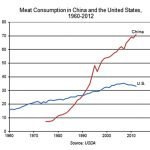In December 2015, the FDA announced the creation of the Office of Dietary Supplement Programs, elevating the program from its previous status as a division under the former Office of Nutrition, Labeling and Dietary Supplements (now the Office of Nutrition and Food Labeling). As part of that action, the agency reaffirmed its commitment to remove from the market products that contain potentially harmful pharmaceutical agents, are otherwise dangerous to consumers, or are falsely labeled as dietary supplements; enforce the dietary supplement good manufacturing practices regulation; and take action against claims that present a risk of harm to consumers (such as egregious claims of benefit in treating serious diseases) or economic fraud.
Last month, in line with its mandate, the newly created FDA office issued a revised draft guidance concerning premarket safety notifications for new dietary ingredients (NDI).1 http://www.fda.gov/Food/GuidanceRegulation/GuidanceDocumentsRegulatoryInformation/ucm257563.htm Under the Dietary Supplement Health and Education Act (DSHEA), manufacturers or distributors must notify the FDA at least 75 days before beginning to market a dietary supplement that contains a new dietary ingredient (one that was not marketed in the United States before Oct. 15, 1994), unless the NDI is used in the food supply without chemical alteration.
The FDA estimates that there are more than 55,600 dietary supplements on the market, and that 5,560 new dietary supplement products come on the market each year. However, the agency has received fewer than 1,000 NDI notifications since DSHEA was passed in 1994. An initial draft guidance, “Dietary Supplements: New Dietary Ingredient Notifications and Related Issues,” was released in 2011. After considering the feedback received on that draft, the FDA has now revised the draft guidance to “clarify” several important points that were apparently misunderstood or not fully explained. And now, the FDA, as required by law, is looking for public comments on the revised draft guidance during the 60-day comment period before publishing a final guidance. And that is the point of this newsletter. With that in mind, first let me show you the comments that I left for the FDA on their proposed industry guidance.
My Comments on the FDA’s Draft Guidance Concerning Premarket Safety Notifications for New Dietary Ingredients
Once again, the FDA is coming after your access to dietary supplements.
The biggest problem that I have with the proposed guidelines is that although everything looks reasonable at first glance, on closer scrutiny, it actually means that almost every single supplement created over the last quarter century–and moving forward–will need to file a notification document with the FDA—and that includes, for the most part, even supplements that contain ingredients that have previously been approved for use multiple times before. Let me explain.
On page 13 of the guidelines, you state, “An NDI is defined as a dietary ingredient that was not marketed in the U.S. before October 15, 1994.” You then go on to clarify that a dietary supplement is defined as any one of the following:
 Vitamin
Vitamin- Mineral
- Herb or other botanical
- Amino acid
- A dietary substance for use by man to supplement the diet by increasing the total dietary intake; or
- A concentrate, metabolite, constituent, extract, or combination of any ingredient described in 1-5 above.
Elaborating further, you then state that even ingredients that were in use before 1994, are now classified as NDI’s if they have been:
- Chemically altered
- Or if manufacturing has altered the structure on an ingredient
Incidentally, on page 19, you drop the little nugget that the FDA has no authoritative list of pre-1994 ingredients, so good luck to manufacturers with that one.
Putting it all together, then, the problem is that when you actually think about it, the FDA definition of an NDI pretty much means that every single supplement created since 1994 would qualify as an NDI and require NDI notification.
Let me follow in your footsteps and clarify with some examples:
- Goji berry juice would now be considered an NDI since no one sold goji berries in juice form before 1994, and juicing both alters the structure of the goji berries, which means that under 6 above, it would qualify as a concentrate. In fact, goji falls afoul of another one of your guidance rules. On page 14, you state: The use of an ingredient in a conventional food before October 15, 1994, does not determine whether the ingredient is an NDI. What matters is whether the ingredient was marketed as a dietary ingredient—meaning that unless it was marketed as a dietary supplement, or for use in a dietary supplement, and not just as a food before October 15, 1994, it’s an NDI. That means that even selling plain, unadulterated goji berries would now require notification if you sold them today as a supplement.
- Pretty much all protein powders would also now require notification, as new processes have changed the structure of the end product. Whey alone has gone through multiple manufacturing iterations to improve the purity, concentration, and mix of amino acids found in the final product. These would all qualify as structural changes.
- Every new strain of acidophilus would now require registration according to the guidelines. And for that matter, pretty much every single vegetarian sourced probiotic would now be an NDI, since those products didn’t exist before 1994.
- Every food bar sold as a supplement would require registration.
- Heck, even baking the food bar to make it into a brownie qualifies as both structural and chemical changes in the final product.
- Etc.
- Etc.
- Etc.
And let’s be clear here. It’s not a one and done. It’s not like the creator of an ingredient can file a notification for that ingredient, clarifying its efficacy and safety for everyone who then chooses to use it in their product. As you state in the guidelines, any time an NDI is used in a different way or in a different combination with other NDI’s, it requires new notification. The bottom line, again: is that virtually every ingredient introduced since 1994 and moving forward will require notification every time it is used in any different formula by any different company.
So what does notification entail? Maybe it’s not that onerous. And the answer to that question depends on who’s doing the notifying. If it’s the ingredient supplier, then they have most of the information readily in hand. If it’s the retailer who is selling a custom formula made from ingredients purchased from a supplier, then it’s not so easy.
 As part of the notification, you require: Toxicology Studies, Human Studies, Other Studies, and a History of Use. In addition, you request a description of the manufacturing process used to make the NDI, including process controls; a description of the physical properties and chemical or molecular composition and structure of the NDI, and a specification sheet that describes the critical identity and safety attributes of the NDI, including the purity and strength of the NDI and the levels and identities of any impurities and contaminants—which, when you’re dealing with botanicals, varies from batch to batch.
As part of the notification, you require: Toxicology Studies, Human Studies, Other Studies, and a History of Use. In addition, you request a description of the manufacturing process used to make the NDI, including process controls; a description of the physical properties and chemical or molecular composition and structure of the NDI, and a specification sheet that describes the critical identity and safety attributes of the NDI, including the purity and strength of the NDI and the levels and identities of any impurities and contaminants—which, when you’re dealing with botanicals, varies from batch to batch.
Quite simply, this information will not be readily available to down-the-line supplement manufacturers or formulating companies. This will require thousands of dollars to gather—and for what? Most of these ingredients already have a track record of safety, verified over millions of doses. In fact, the vast majority of these so called NDI’s are ingredients that have been used for hundreds of years by natural healers, decades in Europe, or are simply isolations of natural substances such as L-carnosine or DMAE and have demonstrated an exemplary safety record. In the real world, they are de facto GRAS. And yet you want them to be treated as NDI’s every time they are used.
And that’s just the tip of the iceberg. As written, your notification process “assumes” that the vast majority of formulas under discussion are single ingredient formulas. What if the dietary supplement in question contains 10 ingredients (and again, understanding that as defined in the guidelines, virtually every ingredient is now an NDI)? Notification for a multi-NDI, formula-based dietary supplement could now involve 200-300 pages and cost tens of thousands of dollars to put together. And when you consider that most companies now sell far more multi-NDI dietary supplements VS single-NDI supplements, the cost for compliance could go into the hundreds of thousands of dollars—or higher—per company. And again, to what end? Again, the vast majority of these potential NDI’s are ingredients that have been used in some variation for hundreds of years by natural healers, decades in Europe, or are simply isolations of natural substances such as L-carnosine or DMAE. In the real world, they are de facto GRAS—or at least should be.
But it gets worse. If a company actually goes through the hoops and does everything required under your guidelines, they receive no approval, no certification, and no authorization. There’s no guarantee that this investment in time and money will even matter since everything in the guidelines is open to interpretation. You hold it within your discretion to rule any way you want, regardless of the evidence, at any time in the future—negating all of the time and money the company spent submitting their notification documents.
The net effect, then, of these new guidelines will be to:
- Force the vast majority of health and nutrition companies out of business
- Concentrate the industry in the hands of a small group of large corporations who will be incentivized by the guidelines NOT to innovate
- Stifle advancements in the industry
- Significantly increase costs to the surviving companies, who are now forced to submit the same documentation over and over (as every new use requires notification), proving the same thing over and over—all of which increased costs will be passed on to consumers
- Significantly increase the FDA’s workload. Instead of just receiving one set of documentation per ingredient validating the safety of that ingredient, you are now going to get several hundred copies of the same documentation as each company that uses the ingredient is forced to submit the same documentation. Multiply that by several thousand NDI’s, several thousand companies, and several thousand new multi-NDI formulas, and FDA will now have to track several hundred thousand sets of documentation.
- And the net effect will be not even one iota of improvement in consumer safety
A far better, simpler, more cost effective approach would be as follows:

- Simply enforce existing regulations, including cGMP, more evenhandedly and more consistently so companies actually know what they’re supposed to do. Don’t force all the legitimate companies to pay the price for a handful of companies that blatantly misbehave. And besides, new regulations are not going to stop the bad behavior. Quite simply, bad companies will only stop cheating on regulations when you make it too painful for them to continue doing so.
- Remember, it’s already illegal to hide pharmaceutical drugs in dietary supplements, and still they do it. If companies are doing it now, they’ll do it when you change the regulations. Again, new guidelines won’t change that. Only better enforcement of existing regulations will resolve the problem.
- Dietary supplements are not pharmaceutical drugs. Don’t try and treat them as such. Beef up the GRAS program. Notification for NDI’s and supporting documentation should absolutely be submitted—but it should be a one and done scenario. Once an NDI notification has been filed and validated for a new ingredient, then that NDI should be added to a new, FDA certified, ongoing, GRAS (Generally Regarded as Safe) list. At that point, the list should be available so that anyone else can use any ingredient in that list in any dietary formula without further notification—as long as they stay within the guidelines outlined in its GRAS listing.
- But for that to happen, FDA will need to maintain a real, continually updated, NDI GRAS database.
- Also, stating, as you do in your guidelines, that you have no formal list of dietary ingredients that were acceptably in use before 1994, is nothing less than an abrogation of your responsibilities as overseer of dietary supplements. Now that computer databases and internet access are commonplace, maintaining such a database would be relative child’s play. And any costs incurred would be far, far, far, less than the costs incurred by forcing company, after company, after company to file the same notification paperwork over and over and over again for well-established NDI’s.
- Once again, create a GRAS database that you maintain and support—updating it as new NDI’s notifications are received and the ingredients’ safety is validated. With an online database, any changes to an ingredient’s status could be effected in a matter of minutes should new information become available down the road.
- Allow companies to then create supplements simply by combining any ingredients on the list in any way they want—at any dosages within the range recommended in the GRAS database. Of course, you will have to authorize real dosing ranges that accommodate the reality of the NDI as it is used in the real world, as long as there are no “genuine” safety issues associated with those doses. In other words, don’t play the RDI game of minimal dosing.
- Streamline the approval process for moving an ingredient from notification to GRAS so that it takes no longer than six months, assuming that it passes. If you try and use delay tactics to thwart the introduction of new NDI’s, many companies will simply ignore your attempts at regulation—as they are doing today.
- And finally, bring in some real world dietary supplement experts to help with your approval process. If all decisions on supplements are being made by medical doctors, mainstream academics, and bureaucrats, then their judgements will be ignored by the industry as a whole. Everyone in the industry knows that these people have a bias against alternative health supplements and will actively work to eliminate, or at least throttle down their use. It’s kind of like asking the NFL Commissioner’s Office to oversee soccer. They view soccer as a rival for attention and talent. If they ran it, they would either deliberately try to crush its growth if given a chance—or at the very least, would be perceived as doing so.
In effect, your proposed guidelines have nothing to do with product safety and everything to do with crushing the alternative health industry and forcing it into the hands of large corporate entities that can afford to submit NDI paperwork for every product they produce.
And when it comes to evaluating an NDI for GRAS, you don’t have to be perfect, just conscientious. Let’s be honest. No ingredient is perfectly safe, not ever pure water. Eventually, someone, somewhere will have an allergic reaction to every ingredient. For water, that allergic reaction is called aquagenic urticaria. Or someone, somewhere will use an ingredient far in excess of the recommended instructions and suffer injury or death. For water, that’s called water intoxication and can lead to fatal hyponatremia when it causes sodium levels to drop too low. But the world understands that nothing is 100% safe—just mostly safe. No one is suggesting that we regulate the sale of drinking water just because, on rare occasions, someone dies from allergic reaction or overdosing. And as for possible NDI/pharmaceutical drug conflicts, again let’s be honest. That’s not a problem inherent in NDI’s. It’s a problem inherent in the pharmaceutical drugs. In fact, dangerous multidrug interactions are so common that it is now an area of full time study in the medical community.
 As a reality check, if you remove any fatalities caused by companies that blatantly and illegally break the rules from your analysis, then, as a whole, the supplement industry is one of the safest industries in the world. There are far fewer fatalities that result from consuming supplements than from consuming food. In fact it’s not even close. According to CDC statistics, each year, 48 million people suffer food poisoning, 128,000 are hospitalized, and 3,000 die. And no one’s suggesting that every new food needs to submit extensive notification documents to the FDA.
As a reality check, if you remove any fatalities caused by companies that blatantly and illegally break the rules from your analysis, then, as a whole, the supplement industry is one of the safest industries in the world. There are far fewer fatalities that result from consuming supplements than from consuming food. In fact it’s not even close. According to CDC statistics, each year, 48 million people suffer food poisoning, 128,000 are hospitalized, and 3,000 die. And no one’s suggesting that every new food needs to submit extensive notification documents to the FDA.
The bottom line is that the proposed guidelines will be a regulatory nightmare and will accomplish nothing in terms of improving safety. They will merely drive companies out of business. Instead of new regulations, as I stated above, the FDA simply needs to start enforcing the regulations on the books and start compiling an ongoing, certified, dietary supplement ingredient GRAS list so that everyone knows what’s what, and companies and consumers no longer have to play a grand guessing game.
…End of Comments
Don’t Let Them Take Your Health Freedom
So, those were the comments that I submitted to the FDA. Although you can comment on any guidance at any time, to ensure that the FDA considers your comments on this draft guidance before producing its final version, you need to submit your comments by Oct 11th. Note: if you choose to comment, your comments will become a permanent part of the Federal Record. For example, you can still access comments I made on FDA First Amendment Issues back in 2002. How cool is that? And if you submit after 10/11, your comments will still be part of the official record, they just won’t influence any decision being made on the new guidelines.
I encourage you to go for it. Let your voice be heard. You don’t need to be a doctor or an academic. You just need to have an opinion. And you don’t need to comment on every aspect of the draft document. You can take one item, or just indicate your overall feelings about the document, the FDA, or supplements in general. The important thing is that you don’t have to speak through lobbyists or your government representatives. Here’s your chance to speak directly to the FDA, the agency that controls your right to get the supplements you want. It’s also your chance to have your voice become a permanent part of the Federal Record. At the time of my writing this, only 14 people had chosen to exercise their right and had taken the time to comment. If that level of participation doesn’t change before the comment period is up, the regulations will pass as written, and you will find your access to supplements severely restricted. The bottom line is that your health freedomis at risk. If you don’t make use of this opportunity, then you really can’t complain if down the road, the FDA takes away your right to purchase your favorite supplements.
- Here is the link to the complete draft document (FDA-2011-D-0376-1650) on which you’ll be commenting: http://www.fda.gov/downloads/Food/GuidanceRegulation/GuidanceDocumentsRegulatoryInformation/UCM515733.pdf
- And here’s the link to where you make your comments: http://www.regulations.gov/comment?D=FDA-2011-D-0376-1650.
- Or if you want to mail it in, here are the guidelines. http://www.regulations.gov/document?D=FDA-2011-D-0376-1650
- You need to submit your comments by October 11th to have them be considered in the final redrafting of the guidance document. But even if you submit them after the 11th, they will still become part of the permanent record. (By the way, they won’t publish it if it contains obscenities.)
Go for it—even if you just want to let the FDA know that you don’t want them to stop companies from offering you the supplements on which you have come to depend!!
PS: And here’s the link to my comments filed with regulations.gov; they are now part of the public record. (Note: the full comments are contained in the attachment.) Speak up. Let your voice be heard. http://www.regulations.gov/document?D=FDA-2011-D-0376-1666
If you don’t speak up, you can’t complain when the FDA takes away your right to purchase your favorite supplements.

References
| ↑1 | http://www.fda.gov/Food/GuidanceRegulation/GuidanceDocumentsRegulatoryInformation/ucm257563.htm |
|---|












I depend on supplements for
I depend on supplements for my health and so do others.
This Fascist Food policy must END!!!
It is important to keep
It is important to keep supplements and alternative salves, creams and so forth freely on the market. Many people feel they benefit from these available products for which they do not need to see a physician to procure. It would really be a travesty to bundle all of these worthwhile products under Big Pharma which would both limit their availability and would raise the prices astronomically.
As the old expression goes, “If it ain’t broke, don’t fix it.”
Thank you,
Dr. Mandy
FDA is all about $ for Big
FDA is all about $ for Big Pharma and insurance companies and nothing about caring for people’s health. Supplements are effective and relatively inexpensive. I totally depend on them!!
I wonder how many
I wonder how many prescriptions medicine killed people in one year. How many Doctors missed prescribed medicine that killed people, how many operations were bungled that killed people? Yet I haven’t seen a list of people killed by herbs.
Thank you, a million and more
Thank you, a million and more times. I depend on your products as well as other’s products to help me take care of my health. I will follow your lead.
Couldn’t we invoke something
Couldn’t we invoke something from the Bible, Bill Of Rights, or The Constitution validating our God-given right to purchase and use natural foods & products? Jon’s article needs to go into the hands of Congress and balance the power of FDA to do what’s best for the people.
I am neither a US citizen nor
I am neither a US citizen nor resident, so do not feel free to address the FDI on this one. Although the outcome will affect those living in foreign parts as many supplements originate from the US. But in Europe there is the same war on supplements launched by the proxies of Big Pharma (and everyone knows that the FDI is an extension of the pharmaceutical industry, linked by mutual self-interest and “revolving doors”.
The attack on alternatives to poison-slash-and-burn medicine is multi-pronged. For those who understand some French, I paste below an excerpt from an e-mail newsletter received this morning:
” LE PLAN SECRET DE BIG PHARMA POUR PULVÉRISER LES MÉDECINES DOUCES
” Chère lectrice, cher lecteur,
” Les médecines naturelles ont le vent en poupe.
” On retrouve les huiles essentielles à la une des émissions de télévision, les compléments alimentaires font les couvertures des journaux ; même les magazines estampillés « sérieux » vantent « des plantes pour aller mieux », « la méditation pour être heureux » ou « les bienfaits du jeûne thérapeutique ».
” Après la multiplication des scandales sanitaires (Médiator, Vioxx, pilule de 3e génération, etc.) le tout médicament semble un peu remis en question. On ose désormais dire que les médicaments ont de graves effets secondaires.
” Certaines universités, certains hôpitaux ont intégré dans leur pratique des techniques que la médecine officielle considérait jusqu’alors comme de la quasi sorcellerie : hypnose, yoga, visualisation, EFT, médecine énergétique, etc.
” Une révolution ?
” Ne vous y trompez pas. Tout ceci est un gigantesque leurre.
” LA RUSE TERRIBLE DE « BIG PHARMA :
“Derrière le retour en grâce apparent des médecines douces et des techniques traditionnelles de soins, se cache la plus grande offensive jamais menée par les laboratoires pharmaceutiques pour discréditer durablement la santé naturelle.
“Ils ne peuvent pas (encore) l’interdire ? Soit. Mais Big Pharma a trouvé la parade :
” Tout faire pour cantonner les médecines douces au rôle du petit truc qui ne fait pas de mal. Et rabâcher dans les médias officiels l’air du « après tout, si c’est inoffensif » :
” « Mais oui, mais oui, vous pouvez bien prendre une tisane de sauge ou de thym de si vous avez un rhume. » « Un peu d’huile essentielle de menthe poivrée contre le mal de tête ? Si ça vous chante, tant que vous vous faites vacciner contre la grippe et que vous prenez des statines contre le cholestérol… »
” ……… ”
F stands for Food in FDA
F stands for Food in FDA
So why do they let GM corns shown by Seralini to be cancerigenous be sold freely?
And Glyphosate is defined by WHO as probable cancer causing, so why do they not ban that?
Aside from this, D stands for Drug and they approve drugs that kill hundreds of thousands of people a year.
And A stands for Administration… So they do administer the Big Corporate interests impeccably.
Nobel Health Prize nominees?
Thank you for taking the time
Thank you for taking the time to explain what is wrong with this proposed plan. I agree about losing the right to complain if you don’t do anything about it. That said, I submitted my comments.
The FDA has been playing with
The FDA has been playing with our health way too long. I am happy to protest in this way in order to help stop the FDA tyranny.
Please start taking more
Please start taking more care of the supplemental consumer and less of the AMA and drug makers.